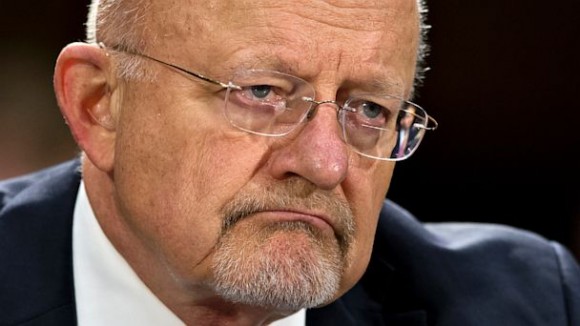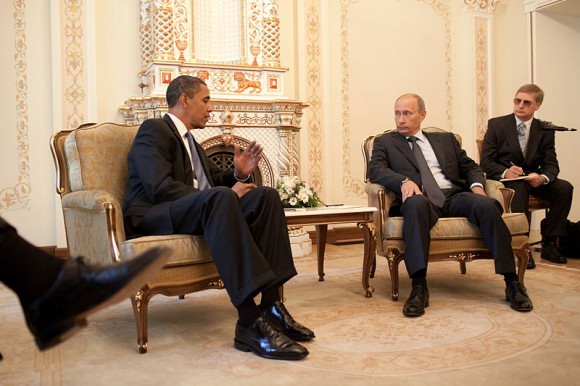There are 54 different countries on Earth that the U.S. is legally obligated to militarily protect and defend if they get into their own conflicts. Below is the State Department’s list of them (via Micah Zenko):
NORTH ATLANTIC TREATY
A treaty signed April 4, 1949, by which the Parties agree that an armed attack against one or more of them in Europe or North America shall be considered an attack against them all; and each of them will assist the attacked by taking forthwith, individually and in concert with the other Parties, such action as it deems necessary, including the use of armed force.
PARTIES: United States, Albania, Belgium, Bulgaria, Canada, Croatia, Czech Republic, Denmark, Estonia, France, Germany, Greece, Hungary, Iceland, Italy, Latvia, Lithuania, Luxembourg, Netherlands, Norway, Poland, Portugal, Romania, Slovak Republic, Slovenia, Spain, Turkey, United Kingdom
AGREEMENT BETWEEN THE UNITED STATES AND AUSTRALIA AND NEW ZEALAND
A Treaty signed September 1, 1951, whereby each of the parties recognizes that an armed attack in the Pacific Area on any of the Parties would be dangerous to its own peace and safety and declares that it would act to meet the common danger in accordance with its constitutional processes.
PARTIES: United States , Australia, New Zealand
PHILIPPINE TREATY (BILATERAL)
A treaty signed August 30, 1951, by which the parties recognize that an armed attack in the Pacific Area on either of the Parties would be dangerous to its own peace and safety and each party agrees that it will act to meet the common dangers in accordance with its constitutional processes.
PARTIES: United States, Philippines
SOUTHEAST ASIA TREATY
A treaty signed September 8, 1954, whereby each party recognizes that aggression by means of armed attack in the treaty area against any of the Parties would endanger its own peace and safety and each will in that event act to meet the common danger in accordance with its constitutional processes.
PARTIES: United States , Australia, France, New Zealand, Philippines, Thailand, and the United Kingdom
JAPANESE TREATY (BILATERAL)
A treaty signed January 19, 1960, whereby each party recognizes that an armed attack against either Party in the territories under the administration of Japan would be dangerous to its own peace and safety and declares that it would act to meet the common danger in accordance with its constitutional provisions and processes. The treaty replaced the security treaty signed September 8, 1951.
PARTIES: United States, Japan
REPUBLIC OF KOREA TREATY (BILATERAL)
A treaty signed October 1, 1953, whereby each party recognizes that an armed attack in the Pacific area on either of the Parties would be dangerous to its own peace and safety and that each Party would act to meet the common danger in accordance with its constitutional processes.
PARTIES: United States, Korea
RIO TREATY
A treaty signed September 2, 1947, which provides that an armed attack against any American State shall be considered as an attack against all the American States and each one undertakes to assist in meeting the attack.
PARTIES: United States, Argentina, Bahamas, Bolivia, Brazil, Chile, Colombia, Costa Rica, Cuba, Dominican Republic, Ecuador, El Salvador, Guatemala, Haiti, Honduras, Nicaragua, Panama, Paraguay, Peru, Trinidad & Tobago, Uruguay, Venezuela
This illustrates rather well the sheer magnitude of U.S. commitments around the world. It’s worth remembering, too, as Nima Shirazi noted, that not every state that Washington commits itself to militarily is listed here (Israel is conspicuous for its absence). So, U.S. military commitments go beyond even this lengthy list.
Why? Politicians will tell you this is about defending freedom and democracy (right…). Policy wonks will rattle off old chestnuts about global security and international cooperation. More accurately, this helps institutionalize U.S. hegemony (that is, unrivaled power over all other states in the system).
This doesn’t merely demonstrate how taxpayer money and resources go to the defense of other countries. It illustrates the pervasive conviction in Washington that there are few, if any, spots on the planet that aren’t vital U.S. interests that require military interventionism. America’s mandate is limitless, it would seem.






